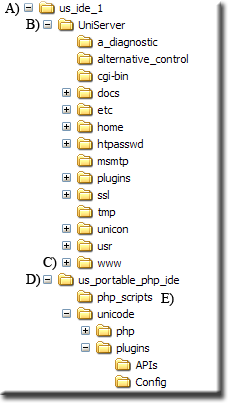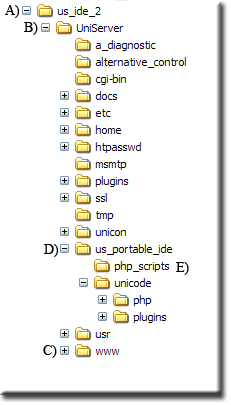Uniform Server PHP IDE: Introduction
|
Uniform Server PHP IDE : Introduction | XDebug Overview | IDE Overview | PHP CLI | XDebug WinBinder
|
|
| Uniform Server PHP IDE. |
Uniform Server PHP IDE
Uniform Server is an excellent test WAMP; extract it, have a play and throw it away if you don’t like it. Similarly, this simple PHP IDE plugin is also a throw away. First extract a new version of Uniform Server and then the IDE. Once extracted you can start writing PHP CLI code and test it in the integrated console window. Alternatively you can write WebPage code and immediately run it on a working web server. Should this package not meet your expectations, just delete it and search the Internet for something that does.
The package offers a complete PHP coding environment, and is ideal for learning PHP. Scripts are entered using Notepad++, and a single button click provides syntax checking. Double clicking on any highlighted error takes you to the appropriate line in the edit window for correction. Corrected code is run from menu options either in a console window for CLI scripts or a browser to display web pages. Should the code not perform as expected, it can be debugged using the integrated XDebug PHP module and Notepad++ debug client.
WebPages are edited and updated directly on Uniform Server, avoiding the need to FTP completed pages to a server site.
Two versions
There are two variants of the IDE: self-contained and plugin.
- The self-contained version includes a built-in PHP interpreter allowing it to run independent of Uniform Server. This is ideal for learning PHP and CLI scripting.
- A plugin version which shares the PHP interpreter integrated in Uniform Server; this greatly reduces the plugin's size.
Choose one of the following installation options.
Installation option 1 -Self-contained Portable PHP IDE
Download and Install
The following assumes you are using drive H and folder us_ide_1. This is not mandatory; feel free to substitute another drive letter and folder as appropriate.
Download IDE
Download the self-extracting archive file from SourceForge.
- Create a new folder H:\us_ide_1
- Download file us_portable_php_ide_1_0_0.exe from SourceForge
- Save to the above folder (us_ide_1)
- Double click us_portable_php_ide_1_0_0.exe. This extracts all files; no need to change the path.
- Folder us_portable_php_ide is created
Download Uniform Server
This step is optional. However if you want to create and test web pages, extract the latest version of Uniform Server UniServer 5.6.15-Nano or UniServer 6.0.5-Carbo
- Save downloaded file; for example, UniServer5_6_15.exe to folder H:\us_ide_1
- Double click UniServer5_6_15.exe to extract all files; no need to change the path.
Configuration
If you have downloaded Uniform Server and wish to run XDebug, it requires configuring as follows:
[xdebug] zend_extension=H:/us_ide_1/UniServer/usr/local/php/extensions/php_xdebug-2.1.0-5.3-vc6.dll xdebug.remote_autostart=on xdebug.remote_enable=on xdebug.remote_host=127.0.0.1 xdebug.remote_port=9000 xdebug.remote_handler=dbgp xdebug.remote_mode=req xdebug.idekey=default |
Note 1:
Depending on the version that matches your installation, substitute the proper file name on the end of the path
zend_extension=H:/us_ide_1/UniServer/usr/local/php/extensions/php_xdebug-2.1.0-5.3-vc6.dll
Change extension "php_xdebug-2.1.0-5.3-vc6.dll" to match your version of Uniform Server
- For 5.6.15-Nano use php_xdebug-2.1.0-5.3-vc6.dll
- For 6.0.5-Carbo use php_xdebug-2.1.0-5.3-vc9.dll
Note 2:
If you now move folder us_ide_1 and all its content to a different location, all the paths will be automatically updated. Ensure the new location does not contain spaces in any folder names.
Installation option 2 - Plugin PHP IDE
Download and Install
The following assumes you are using drive H and folder us_ide_2. This is not mandatory; feel free to substitute another drive letter and folder as appropriate.
Download Uniform Server
Download the self-extracting archive file from SourceForge.
- Create a new folder H:\us_ide_2
- Extract the latest version of Uniform Server
- Save the downloaded file; for example, UniServer5_6_15.exe to folder H:\us_ide_2
- Double click UniServer5_6_15.exe This extracts all files; no need to change the path
Download IDE
Download the self-extracting archive file from SourceForge.
- Download file us_plugin_php_ide_1_0_0.exe from SourceForge
- Save to folder H:\us_ide_2\UniServer
- Double click us_plugin_php_ide_1_0_0.exe. This extracts all files; no need to change the path
- Folder H:\us_ide_2\UniServer\us_portable_ide is created
Configuration Part 1
To run XDebug on Uniform Server requires configuring as follows:
[xdebug] zend_extension=H:/us_ide_2/UniServer/usr/local/php/extensions/php_xdebug-2.1.0-5.3-vc6.dll xdebug.remote_autostart=on xdebug.remote_enable=on xdebug.remote_host=127.0.0.1 xdebug.remote_port=9000 xdebug.remote_handler=dbgp xdebug.remote_mode=req xdebug.idekey=default |
Note 1:
Depending on the version that matches your installation, substitute the proper file name on the end of the path
zend_extension=H:/us_ide_2/UniServer/usr/local/php/extensions/php_xdebug-2.1.0-5.3-vc6.dll
Change extension "php_xdebug-2.1.0-5.3-vc6.dll" to match your version of Uniform Server
- For 5.6.15-Nano use php_xdebug-2.1.0-5.3-vc6.dll
- For 6.0.5-Carbo use php_xdebug-2.1.0-5.3-vc9.dll
Note 2:
If you now move folder H:\us_ide_2\UniServer and all its content to a different location, all the paths are automatically updated. Ensure the new location does not contain spaces in any folder names.
Configuration Part 2
Edit file H:\us_ide_2\UniServer\usr\local\php\php_cli_ide_debug.ini
Change this line to match the php_xdebug version you are using (shown for 5.6.15-Nano)
zend_extension=./extensions/php_xdebug-2.1.0-5.3-vc6.dll
Folder Structure
|
Commonality Folder structure for both versions is similar as shown on right
If you are learning PHP or writing PHP CLI scripts, there is no need for a server. You can delete folder UniServer B) and use the portable IDE in folder D.
This integrates both Uniform Server and IDE. In reality, this should be considered as the IDE! |
Design Information
A step-by-step design guide is provided; see page PHP PORTABLE IDE
Summary
The above shows how to install the Uniform Server IDE.
Next page provides an overview of the XDebug PHP module.

